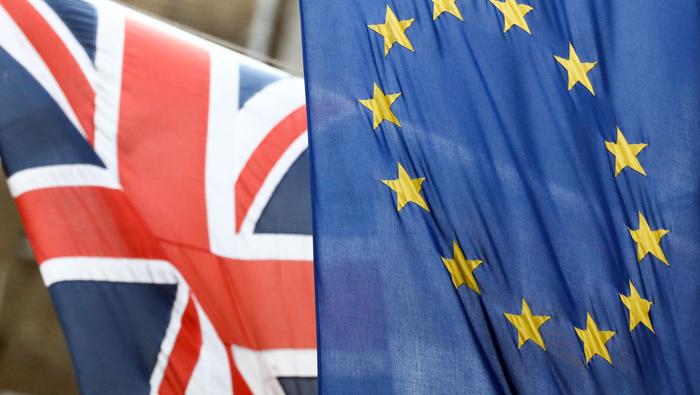Pound Prediction Post Brexit, Outlook for UK Assets and More - Coming Up in Our Podcast This Time:
- Pound Prediction: Will the UK reach a deal?
- European bonds: Is the spread between Italian bonds and German bonds coming down?
- European stocks: How much value?
“There is around a 40% chance of No Deal for October 31st”
This time on Trading Global Markets Decoded, our host Martin Essex is joined by Philip Shaw, Chief Economist at Investec London. Discussion points: the Brexit deadline – Will the UK reach a deal? Where now for European stocks and bonds? And will the ECB cut rates even further? You can listen to this podcast with Philip Shaw by clicking on the link above or one of the alternative platforms listed below.
Follow our podcasts on a platform that suits you
iTunes: https://itunes.apple.com/us/podcast/trading-global-markets-decoded/id1440995971
Stitcher: https://www.stitcher.com/podcast/trading-global-markets-decoded-with-dailyfx
Soundcloud: https://soundcloud.com/user-943631370
Google Play: https://play.google.com/music/listen?u=0#/ps/Iuoq7v7xqjefyqthmypwp3x5aoi
Spotify: https://open.spotify.com/show/6FtbTf4iGyxS0jrQ5jIWfo
Brexit – will the UK reach a deal?
The Brexit deadline is edging closer: will the UK reach a deal? “Our central case is the UK will reach a deal,” Philip says. “It’s not impossible that a deal is agreed with the EU before October 19th, [but] after that it becomes more difficult for the UK Parliament to get everything through by the 31st.”
Philip believes that, in Boris Johnson, the UK has a Prime Minister who probably wants to leave with a deal, but is more willing than his predecessor Theresa May to leave without if he doesn’t get an acceptable one. Philip estimates a 40% chance or so of No Deal on the 31st, leaving options including a unity government, an election, or even a possible second referendum to follow.
Trading Sterling – Crunch Time
As ever, economic commentators are debating the effect on GBP. “If the UK leaves without a deal, our view is the Pound doesn’t fully factor in a No Deal outturn,” Philip says. Depending on the severity of No Deal, and contingent on the number of mini agreements the UK has with the EU 27, in a post-EU environment, he believes Sterling could fall to as low as 1.0500 against USD. “By contrast, if the UK leaves with a deal you can see Sterling going up to 1.3000 against Greenback and maybe gaining ground after that if you see signs of the economy improving with more business investment.”
It helps to be nimble, and identify the shorter-term dynamics that will be moving the currency one way or another, but events like the prorogation of Parliament and talk of more flexibility in the Irish backstop make it harder still. “We’re in a period of heightened uncertainty and news flow is all-important for that reason.”
Prediction for UK assets
UK gilts should rally in the event of No Deal, Philip says, as well as the likelihood of the Monetary Policy Committee easing policy and adding liquidity to the UK banking system.
Could the Bank of England actually raise rates? “We don’t believe they would on a No Deal scenario, particularly if the economy looked to be entering a downturn and most on the Committee have suggested rates would fall.”
As for the FTSE, it’s a tale of two types of companies in the index: those with substantial overseas earnings and the more UK-facing stocks. In general, when Sterling falls the index rises, because international companies’ overseas earnings are more valuable when converted back to a weak Sterling.
But the mood is more negative towards UK-facing stocks such as housebuilders and support service companies, many of which are worried about the impact of Brexit. “If we left with a decent deal those [UK-facing companies] would rebound and the international earners would fall back, and the net impact on the FTSE 100 of reaching a deal would be negative.”
However, in the event of a No Deal, the FTSE 100 would be expected to outperform the FTSE 250, the latter of which is largely composed of UK-facing companies. But caution should be advised when approaching indexes. “You’d have to look at those indexes on a stock by stock basis, or at least a sector by sector basis,” Philip says.
European government bonds
Is the spread between Italian bonds and German bunds coming down? “There may not be much room for further change in that direction. If you’ve got German bonds yielding -50 basis points, we’re not convinced that is great value.
“We probably will see yields coming down modestly towards the end of the year; we’ve seen German 10-year bunds down at around the -70 basis points level, we’re predicting a cut of 10 basis points in the deposit rate.”
He adds that cuts to key European rates when the deposit rate has been negative have been accompanied by other measures, so it’s possible that there will be some increase in QE beyond the €20 billion a month the ECB announced recently. “That could give European government bonds a little upward impetus.”
Investec’s core view is through the course of 2020 the global economy will improve and the Eurozone economy will strengthen alongside it. “We’re far from convinced that yields at current levels are particularly attractive over that period; in terms of short-term dynamics you may see government bond markets rallying further.”
When it comes to European stocks, it's a tricky picture. “We think in terms of the European economy; if our view is correct, there’s value in Euro stocks but that’s a big call given the pockets of weakness we’ve got through much of the Eurozone at the moment."
Could the ECB cut further?
Can the European Central Bank cut further? Philip says there is more downside on the short-term interest rate, and you could see the ECB going for more QE too.
He also discusses the effect of the ECB introducing a tiering mechanism where banks are exempt from a certain amount of deposit rate charge in an environment of negative rates. “If anything that gives the ECB a little bit of scope to cut rates further deeper into negative because the impact on bank profitability has been buffered somewhat by the tiering mechanism, so we think for that reason there is more room on rates and QE too.”
Recession chance?
What are the chances of recession? “There are some who say global recession counts as GDP growth below 2%. We’re not looking at that, our current global economic forecast is 3.0%, and there seems to be a good chance for global economic growth being 3% for 2019.
“We wouldn’t characterize the global economic environment being [conducive to] a recession this year or next year, particularly if you believe there will be at least some progress in trade talks between Washington and Beijing.




